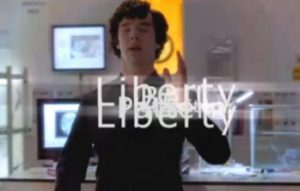This article is the result of a recent, but brief conversation with Matt Hills on Facebook, where we discussed the merits of the BBC’s Sherlock and fandom. Having exchanged views on the significance of fandom and of fan culture to the series, I then put forward a separate idea about Sherlock that had been on my mind for some time – that of Sherlock and a possible connection with ‘Algorithm Culture’. In this respect my approach to the series could be described as historical, especially as Mark Gatiss has publicly stated, he wanted to create a Sherlock Holmes for the 21st century. This further suggests an understanding of social agency in relation to the creation and popularity of certain fictions .Taking this into account, I will argue that Gatiss has achieved his aim of making a Sherlock Holmes for the 21st century, but that the Sherlock series has not been created through social agency, rather, it has been modified to co-exist and to interplay with perceived social agencies in contemporary culture, one of which is described by Scott Lash as “a society of pervasive media and ubiquitous coding” (2007; 71).

The depiction and use of new media in the series has been its most visible modification, and its reference to transmedial story-telling, convergence culture, and locative media – amongst others – points to a significant element of Sherlock. It is with regard to new media, and in particular with regard to algorithm culture, that I want to discuss the Sherlock series. Louisa Stein and Katrina Busse’s excellent work on Sherlock and Transmedia Fandom: Essays on the BBC Series (2012) has covered much ground in this area, but I would like to expand upon these essays in a way which highlights Lash’s description of pervasive media and its impact on Moffat and Gatiss’ creation.
Of course Lash’s reference to ‘coding’ not only alludes to algorithms, but to new distributions of power in contemporary culture – a ‘Post-Hegemonic’ culture to be precise. But it is the relationship between coding and with Benedict Cumberbatch’s Sherlock that is of interest too. Coding or codes, rather than ‘Ratiocination’, is the process for this Sherlock Holmes for the 21st century because as both Lash and Beer point out, codes describe “participatory and collaborative” transformations in an increasingly mediated society and culture (Beer, 2009; 985) and a “society in which power is increasingly in the algorithm.” (Lash, 2007; 71). The ‘Blind Banker’ episode (Series 1) is a good example of how the significance of codes and ciphers in contemporary algorithm culture are represented and constructed in Sherlock, and in ways that suggest themes of empowerment and esoteric knowledge.
Similarly, Benedict Cumberbatch’s re-imagining of Sherlock in the BBC series seems at times almost to personify this new world order, or as Lash describes, this new ontology, especially if we consider Adrian Mackenzie’s description of algorithms – that they “’animate’, ‘order’, and ‘sequence’ the social world” (Beer, 2013; 68). Think of the innovative visual representation of Sherlock’s thought processes in the series, and their emulation of new media – all run and ordered through algorithms. In some ways, the concerns and arguments surrounding the pervasiveness of algorithms in contemporary culture, and their perceived detrimental effect, is allude to and initiated by this representation, emulation, personification of algorithm ordering, but is only fully played out through the dynamics of the relationship between Sherlock and Dr. John Watson.
We cannot begin to describe Watson as a pseudo ‘Luddite’ – he writes the blog after all. But we don’t see Watson’s thought processes either. Here, Watson personifies societal caution, or what Lash describes as “regulation” built upon “‘constitutive’ and ‘regulative’ rules” (2007; 67), whereas Sherlock embodies the power behind algorithms, that of an “’unrepresentable’ force” (Beer, 2013; 69) whose thought processes and prioritizing of content mirror or mimick the efficiency and procedures of algorithms. This, in a culture where, as David Beer points out in his Popular Culture and New Media: The Politics of Circulation (2013), “algorithms are now a deeply embedded part of the production, dissemination, and consumption of everyday culture” (65-66).
But I think the real clincher (for me at least) lies in a description of algorithms that potentially connects the BBC’s Sherlock with notions of social agency. David Beer, citing the computer scientist Herbert S. Wilf, describes algorithms as ‘problem-solving’ tools (2013; 65). It is a description easily applied to Sherlock. Sherlock is the ultimate problem-solving tool, a problem-solver par excellence, employed across classes, institutions, cultures and eras. Instead of ratiocination, the emphasis is now on codes; instead of a network of informers and messengers, we now have a network culture being animated. Sequenced, and ordered by algorithms and Sherlock. And in this respect we can consider how the BBC’s Sherlock potentially taps into the original canon.
In discussing social agency with regard to the popularity of the BBC’s highly successful Sherlock series, there is a problem however. Just how influential is social agency on later adaptations or re-makes of popular stories and characters? There is plenty written on the social and cultural contexts of the original canon that go toward explaining their popularity at the time; from their place within the Fin De Siecle, to their satisfying a moral need, a refutation of industrial and institutional practices embodied by the lone professional detective, a desire for order, and ultimately perhaps, someone who embodies a rational or process for solving problems.
Do these same factors explain the popularity of the new series, or if not popularity, then why the new series has a particular resonance with contemporary audiences in contemporary culture? Are we living in a ‘Fin De Millennial’ and does it bear comparison with the Fin De Siecle? Perhaps Moffat and Gatiss’ engineering of a Sherlock Holmes of the 21st century has tapped into a contemporary culture whose hopes and anxieties are produced, disseminated, and consumed through algorithms. Perhaps this is where, at a subconscious level, Sherlock resonates with a contemporary viewing public. Perhaps algorithm culture is the social agency behind a successful and popular remake.
Kenneth Longden has lectured as part of the academic staff at Liverpool John Moores University in Media, Critical, and Creative Arts, and studied for a MPhil/PhD in Transnational Narratives at The University of Winchester. He is a Fellow HEA, and a Peer-Reviewer for various academic journals. He has been published by Intellect Books and Palgrave MacMillan, and writes on Popular Narrative, Film, Television, Fandom, and Popular Culture.



